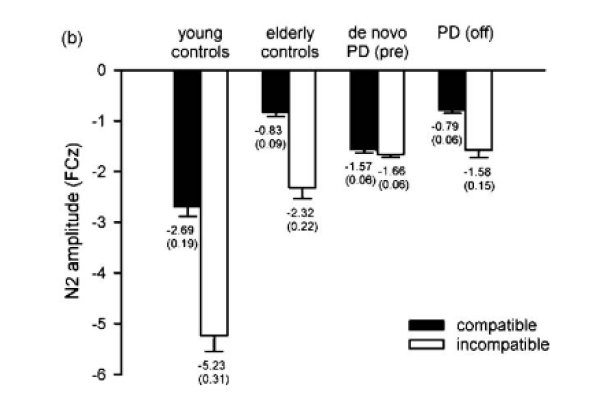2011-02-22

Action selection mechanisms depend upon fronto-striatal structures and are impaired in neurodegenerative basal ganglia disorders. Dopaminergic treatment of Parkinson's disease lingers clinical symptoms, but the question what effects these treatments have neurophysiological mechanisms underlying complex action selection processes have only rarely been addressed.We examined effects of short-term and long-term dopaminergic medication in Parkinson's disease on conflict monitoring or response selection processes. These processes were examined using event-related potentials (ERPs), while subjects performed a stimulus-response (S-R) compatibility task. An extended sample of young and elderly controls, Parkinson's disease patients with a medication history (PDs) and initially diagnosed, drug-naïve de novo PD patients (de novo PDs) were enrolled. Both PD groups were measured twice (on and off-medication or before and 8 weeks after medication onset). The results show that dopaminergic intervention selectively reduced the pathologically enhanced response selection in compatible S-R relations. This medication effect was already evident after short-term treatment, not differing from long-term treatment and performance in elderly controls. Contrary, age-related attenuations of the N2 in incompatible S-R relations, probably reflecting impaired conflict processing or response control, are unaffected by medication. The results suggest that compatible and incompatible S-R relations demand different neuronal mechanisms within the basal ganglia, as only the former are affected by agonizing the dopaminergic system.

Action selection mechanisms depend upon fronto-striatal structures and are impaired in neurodegenerative basal ganglia disorders. Dopaminergic treatment of Parkinson's disease lingers clinical symptoms, but the question what effects these treatments have neurophysiological mechanisms underlying complex action selection processes have only rarely been addressed.We examined effects of short-term and long-term dopaminergic medication in Parkinson's disease on conflict monitoring or response selection processes. These processes were examined using event-related potentials (ERPs), while subjects performed a stimulus-response (S-R) compatibility task. An extended sample of young and elderly controls, Parkinson's disease patients with a medication history (PDs) and initially diagnosed, drug-naïve de novo PD patients (de novo PDs) were enrolled. Both PD groups were measured twice (on and off-medication or before and 8 weeks after medication onset). The results show that dopaminergic intervention selectively reduced the pathologically enhanced response selection in compatible S-R relations. This medication effect was already evident after short-term treatment, not differing from long-term treatment and performance in elderly controls. Contrary, age-related attenuations of the N2 in incompatible S-R relations, probably reflecting impaired conflict processing or response control, are unaffected by medication. The results suggest that compatible and incompatible S-R relations demand different neuronal mechanisms within the basal ganglia, as only the former are affected by agonizing the dopaminergic system.